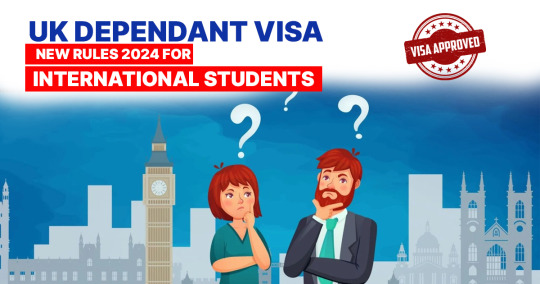#uk student visa dependent
Explore tagged Tumblr posts
Text
https://smartmove2uk.com/uk-student-visa-consultants-bangalore-on-visa-application-guidelines/
Consultants in Bengaluru give a detailed explanation on UK Student Visa applications. If you are a student looking to study abroad, you can call us at +91 98191 27002 or [email protected] for further details.
#uk student visa Bangalore#uk study visa#requirement for uk study visa#uk student visa from india#uk post study work visa#requirement for uk student visa#uk student visa application#psw visa uk#uk student visa dependent
0 notes
Text
UK Student Visa Update: Restrictions on International Student Dependents
The United Kingdom is a popular destination for international students seeking world-class education and diverse cultural experiences. However, the landscape for international students in the UK is set to undergo significant changes, as announced by the UK Government on 23 May 2023. One of the most notable changes is the restriction on international student dependents accompanying their loved…

View On WordPress
#Appendix Student#David J Foster & Co#dependants#DJF Solicitors#Graduate Route visa#Home Office#Home Office Updates#Immigration Policy#International Student#International Students#Lexvisa#Student#student dependant#UK Immigration#UK Immigration Advice#UK Immigration Policy#UK Immigration Solicitors/ Lawyers
0 notes
Text
The Next Big Update from the UK: Dependent or Spouse Visa - It must have been evident to all by now that, besides countries like the US, Canada, and Australia, the UK has also been one of the prime destinations for international students who are considering planning their higher education abroad. They all must read this blog about the UK dependent or spouse visa.
#Jobs in UK#Post Study Work Visa Uk#Study Abroad UK#Study Abroad UK 2023#Top Universities in UK#UK dependent visa#UK Spouse Visa#UK Student Visa#Work in UK
0 notes
Text
UK to Block Dependents from Accompanying International Students as of January 2024 Introduction

In a recent development, the United Kingdom has announced its decision to implement a new policy starting from January 2024, which will restrict dependents from accompanying international students. This significant change has stirred discussions and raised concerns within the international student community. In this article, we aim to delve into the details of this policy, its implications, and provide valuable insights for students affected by this decision.
Understanding the New Policy
Under the new policy set to be enforced in January 2024, dependents of international students will no longer be allowed to accompany them during their studies in the United Kingdom. This decision marks a departure from the previous regulations that permitted dependents, such as spouses and children, to join and live with international students throughout their academic pursuits.
Implications for International Students
The implementation of this policy will undoubtedly have several implications for international students planning to study in the UK. It is crucial for prospective students and their families to understand the potential impact and make informed decisions accordingly.
Increased Independence and Focus
While the restriction on dependents may initially be seen as a challenge, it can also present an opportunity for international students to develop increased independence and focus on their academic pursuits. By being solely responsible for their own well-being, students may find themselves more dedicated to their studies and personal growth.
Financial Considerations
One of the significant factors to consider under this new policy is the potential financial implications. Previously, dependents accompanying international students often added to the overall cost of living, including accommodation, healthcare, and education expenses. With this policy change, international students may experience a reduction in financial burdens, allowing them to allocate their resources more efficiently.
Support and Resources
Recognizing the importance of providing adequate support to international students, educational institutions in the UK are expected to enhance their existing support systems. By focusing on student welfare, academic guidance, and integration programs, universities and colleges can help ease the transition for international students who are now required to navigate their studies independently.
Exploring Alternative Options
For international students who had initially planned to bring their dependents to the UK, it may be necessary to explore alternative options. Understanding that each individual's circumstances vary, students are advised to consider factors such as the duration of their studies, the availability of support networks in the UK, and the overall impact on their family dynamics before making any decisions.
Conclusion
The decision of the UK to block dependents from accompanying international students as of January 2024 introduces a significant change to the educational landscape in the country. While it presents challenges, it also provides opportunities for personal and academic growth. By understanding the implications of this policy, international students can make informed decisions, explore available resources, and navigate their educational journeys successfully.
0 notes
Text
UK Visa Types: A Complete Guide
Introduction
The UK offers a range of visas for travelers with different purposes, from tourism and business to study and long-term residency. Understanding UK visa types can help you determine which visa suits your needs, making the application process easier and faster. This guide outlines the various types of UK visas, eligibility requirements, and key details for each category.
UK Visa Categories
The main categories of UK visas include:
Visitor Visas
Tourist Visa: For those visiting the UK for tourism and leisure.
Business Visa: For attending meetings, conferences, or short-term business engagements.
Family Visit Visa: For visiting family members residing in the UK.
Short-Term Study Visa: For short courses or English language studies.
Eligibility: Proof of financial stability, purpose of visit, and ties to home country.
Duration: Generally, allows stays up to 6 months.
Work Visas
Skilled Worker Visa: For qualified professionals with a job offer from a UK employer.
Health and Care Worker Visa: For healthcare professionals filling roles in the NHS or care sector.
Temporary Worker Visa (Tier 5): For short-term work, including charity, creative, and religious workers.
Eligibility: Job offer, certificate of sponsorship, and minimum salary threshold.
Duration: Varies from 1 to 5 years, with potential for renewal or permanent residency.
Student Visas
Student Visa (Tier 4): For full-time studies at recognized UK institutions.
Child Student Visa: For minors (4–17) attending independent schools in the UK.
Short-Term Study Visa: For courses up to 11 months.
Eligibility: Acceptance at an accredited institution, proof of funds, and English language skills.
Duration: Based on the length of the course, typically up to 5 years for higher education.
Family Visas
Spouse or Partner Visa: For partners of UK citizens or permanent residents.
Parent Visa: For parents of dependent children living in the UK.
Child Dependent Visa: For children of individuals residing in the UK.
Eligibility: Proof of relationship, financial stability, and accommodation.
Duration: Usually up to 2.5 years, with options to renew.
Settlement and Long-Term Residency Visas
Indefinite Leave to Remain (ILR): For those who have resided in the UK long-term.
Ancestry Visa: For Commonwealth citizens with UK ancestry.
Eligibility: Long-term residency, financial independence, and knowledge of life in the UK.
Duration: Permanent residency status, leading to UK citizenship eligibility.
Special and Temporary Visas
Start-up and Innovator Visas: For entrepreneurs looking to start a business in the UK.
Graduate Visa: For students who have completed a degree in the UK and wish to stay to work.
Youth Mobility Scheme Visa (Tier 5): For young people (18-30) from select countries.
Eligibility: Requirements vary by program, including age, funding, and business plans.
Duration: Generally 2 years, with options for renewal or transition to other visa types.

Choosing the Right Visa Type for Your Needs
To determine which visa suits your needs, consider the following:
Purpose of Visit: Is it for work, study, tourism, or family purposes?
Duration of Stay: Short-term visas are ideal for brief visits, while long-term visas are for those planning an extended stay.
Eligibility Criteria: Each visa has specific requirements, including financial stability, sponsorship, and proof of purpose.
Frequently Asked Questions About UK Visa Types
1. Can I switch between UK visa types? Some visas allow switching within the UK, such as moving from a Student Visa to a Skilled Worker Visa. Check individual visa guidelines.
2. What is the processing time for UK visas? Processing times vary by visa type, typically from 3 weeks for visitor visas to several months for settlement visas.
3. Do I need a visa to transit through the UK? Some travelers need a UK Transit Visa if passing through UK airports. Eligibility depends on nationality and travel itinerary.
Conclusion
Understanding UK visa types is crucial for a smooth application process. Whether you’re visiting for a short stay or planning to settle, knowing the right visa type ensures you’re well-prepared. For more detailed information, refer to the official UK government website or consult an immigration advisor.
2 notes
·
View notes
Note
So just wondering basically whatever you can think would be good advice or insight or tips for someone wanting to move to Melbourne from the UK
Doesn't have to be limited to the likes below;
healthcare, prescriptions (I have a few chronic illnesses; nothing too serious, but I do need different medications etc), Visas, nominations, what sort of yearly wage/income would I need to be comfortable, taxes/insurance, bills, education (I don't have a family; but say I wanted to do a uni course, could ?); rent or buy, is a car needed, should I look into city living or suburb living, is it safe for a single female to move there & live on her own... and yeah just anything else you or anyone else can think of, l've never moved abroad before
I'm not sure I'm qualified to answer all of these as I don't have all the right info or experience you're after, but I'll give you what I can and provide some links to some useful sites 🥰
Healthcare here in general is pretty good-- we have bulk billed doctors services, so for just a check up appointment, you'll be paying around $20AUD. For the bulk billing, you will require an Australian Medicare card.
I get a three monthly prescription for my medication from one appointment. My medicine is significantly reduced in cost with the Medicare card/bulk billing.
Here's some info about UK travelers and Australian visas.
https://uk.embassy.gov.au/lhlh/Visas_and_Migration.html
Income to be comfortable varies wildly. Some people suggest no less than $100,000AUD after tax, some much less, others more-- it's really too variable to suggest one specific tax bracket.
I can say that Australia has very high tax rates, so be prepared for that.
Our universities take in a lot of overseas and immigrant students, so you should be good there!
Here's some more info on student loans for non Australian citizens:
https://www.studyassist.gov.au/loan-eligibility/non-australian-citizens
The city has a decent train line and buses are also available.
Melbourne is also a very walkable city.
I personally don't drive atm and can still get around okay.
I live about 45 minutes by train from the CBD-- if you are planning on working inner city, you may want to move closer so you have less of a commute, but it's dependent on how long you personally are willing to travel.
I personally prefer outer suburbs for the quieter, greener living.
Rent or buy is really a personal choice! I'm looking to buy in the next 10 years as I want my own space, but it's super dependent on what you want!
I would say yes, Melbourne is in general a safe city and you should be okay living here alone. I have single friends who have lived in the inner city alone and found it to be fine.
Here's some more info I found that I hope helps!!
https://www.servicesaustralia.gov.au/enrolling-medicare?context=60092
#i really hope this was helpful! there's info you asked for that i don't know the answers too but i wish you all the luck in your travels!!#Melbourne#any melburnians please feel free to add info!
3 notes
·
View notes
Text
God this is horrifying
[Note: I am not copying the whole of these articles, please do read them, I'm just sharing the bits that I think illustrate why you should in fact read them.]
Five-point plan to cut UK immigration raises fears of more NHS staff shortages | Immigration and asylum | The Guardian
Cleverly told MPs on Monday that “migration is far too high and needs to come down … enough is enough”. He added: “Today I can announce that we will go even further than those provisions already in place, with a five-point plan to further curb immigration abuses that will deliver the biggest ever reduction in net migration. “In total, this package, plus our reduction in student dependants, will mean about 300,000 fewer people will come in future years than have come to the UK last year.” Along with raising the salary threshold and scrapping the “shortage occupation list”, Cleverly announced that social care workers would no longer be allowed to bring their dependants when they came to work in the UK. He also said people living in the UK – including British citizens – would now be allowed to sponsor family members to move to the UK only if the person living in the UK earned £38,700, up from £18,600 currently. Finally, the government is asking the Migration Advisory Committee to review the rules for those who have completed undergraduate degrees in the UK. A spokesperson for Downing Street called the package “the biggest clampdown on legal migration ever”. They added: “We believe this is a package which will enable us to significantly reduce numbers whilst achieving economic growth.” It forms one part of a two-part plan to reduce the numbers of people coming into Britain legally and illegally. This week Cleverly is likely to fly to Kigali to sign a new asylum treaty with Rwanda, with ministers ready to bring forward new legislation in an effort to finally kickstart the government’s Rwanda plan.
Families face being split up by UK plan to cut legal migration, lawyers say | Migration | The Guardian
Data suggests this could make it impossible for between 60 and 70% of workers to bring their family into the UK. The crackdown has caused concern among some senior Tory MPs. Alicia Kearns, the chair of the foreign affairs select committee, said on Tuesday she was worried the package as a whole risked dividing families. She told LBC: “It risks being very unconservative”. Madeleine Sumption, the director of the Migration Observatory at the University of Oxford, said: “This is definitely completely different to what any other high income country does.” Under the new rules, someone will be able to bring a family member into the country if they earn £38,700 year. If the partner is already in the UK, both people’s incomes will be taken into account. If someone does not qualify under those rules, they will still be allowed to bring in family members if they have sufficient savings. Under current rules that figure is £62,500, but the government is consulting over whether to increase it.
Lawyers and applicants say, however, that it has led to distress and confusion, with many families already in the process of applying for visas now unsure of what the changes will mean for them. Kelly Robinson, an American PhD student living in Norwich with her partner, Owen Sennitt, had applied for her spousal visa last week, confident Sennitt’s job as a local journalist would be enough to qualify for it. Now she believes she may have to return to the US after eight years living in Britain. “It is a real shock,” she said. “The entire life we have built is being taken away from us overnight.” Nick Gore, a partner at Carter Thomas solicitors, said: “This is devastating for many people that just about meet the existing financial requirements. There is a huge spectrum of people who are affected – some are on minimum wage jobs, others have started their own businesses. This will split families up.”
Thanks to James Cleverly, I may never live in the same country as my kids again | Claire Armitstead | The Guardian
When I mentioned their predicament to a lawyer friend he was dismissive, saying that middle-class families always found a way round these problems. Other friends suggested we remortgage our house to raise the £62,500 capital that was the alternative route to a spousal visa. But it would have to have been in their bank account for a minimum of six months before they even reapplied; this was time their soaring stress levels meant they didn’t have. And anyway, they wanted to pay their own way. The Home Office said any change to the capital threshold would be announced in due course. At the old salary rate, they probably would eventually have worked something out, but at the new one there is no chance. Their relationship will always be based on them both working, and while their combined income would very probably exceed £38,700 a year, neither is going to make that much on their own. My eldest and his partner are now happily settled, so wouldn’t want to move back anyway. The sort of social care work she does is more highly valued in Spain. Meanwhile, my Australian daughter-in-law is in the crazy bind facing citizens of so many of the UK’s former colonies: expected to bend the knee to the monarch of a British state that doesn’t want them. Australia asks the foreign partners of its citizens only to prove their relationship is genuine.
4 notes
·
View notes
Text
James Cleverly has said the “unreasonable practice” of overseas students bringing their family to the UK will end as restrictions on visa routes come into force on Monday.
The Home Secretary said the ban, which affects all but those enrolling on postgraduate research courses and ones with Government-funded scholarships, will cut migration by tens of thousands.
The measures were announced in May by his ousted predecessor Suella Braverman shortly before official figures showed net migration running at 672,000.
The move could hit universities which rely on foreign student fees and could also harm the UK’s reputation as an international destination, experts have warned.
It means that as of Monday, international students starting courses in Britain are no longer allowed to obtain visas for their dependants, unless they are on a postgraduate research programme or a Government-sponsored course.
Prime Minister Rishi Sunak tweeted: “From today, the majority of foreign university students cannot bring family members to the UK.”
The Conservative Party leader said the announcement showed that the Government was “already delivering for the British people” in 2024.
Mr Cleverly said: “This Government is delivering on its commitment to the British public to cut migration. We have set out a tough plan to rapidly bring numbers down, control our borders and prevent people from manipulating our immigration system, which will come into force throughout this year.
“Today, a major part of that plan comes into effect, ending the unreasonable practice of overseas students bringing their family members to the UK. This will see migration falling rapidly by the tens of thousands and contribute to our overall strategy to prevent 300,000 people from coming to the UK.”
Immigration minister Tom Pursglove said: “Our world-leading universities rightly attract some of the brightest students from around the world to the UK.
“But we have seen a surge in the number of dependants being brought by students, which is contributing to unsustainable levels of migration.”
Revised Office for National Statistic (ONS) figures released last month showed net migration ran at a record figure of 745,000 in the year to December 2022. It stood at a provisional 672,000 in the year to June 2023.
Earlier in December, Mr Cleverly set out a raft of new restrictions that he said would cut numbers by 300,000 a year, including hiking the salary threshold for Britons bringing foreign spouses to the UK to £38,700.
The move was criticised for threatening to tear families apart, with many having their future thrown into doubt as the Government considered the details of the policy.
Ministers later rowed back by quietly announcing the threshold would first be raised to £29,000 and then increased in “incremental stages” until spring 2025, which in turn angered MPs on the Tory right in favour of tighter migration controls.
The Home Office said the new package is a “tough but fair” approach, insisting the changes to student visas strike the right balance between “attracting the brightest and best” to Britain but “removing the ability for institutions to undermine the UK’s reputation by selling immigration not education.”
Experts have previously expressed concern about the measure.
Nick Hillman, director of the Higher Education Policy Institute (Hepi) think tank, said international students will go to competitor nations if they are discouraged from coming to the UK.
“As a country, we risk cutting off our nose to spite our face,” he warned.
“International students benefit the UK in all sorts of ways. For example, they are vital to maintaining our world-class university sector as their fees cross-subsidise the teaching of home students and also help to fund UK research.
“I don’t celebrate the new changes and I urge ministers to keep a close eye on competitor nations, who may now seek to recruit those people who would otherwise have come here and benefited the whole of our country.”
Labour has backed the restrictions but said they do not go far enough to tackle “deep failures” in skills and training across the UK labour market or boost the country’s sluggish economy.
“Labour supports these restrictions on dependants for overseas students on shorter courses. However, this is nothing more than a sticking plaster,” shadow home secretary Yvette Cooper said.
“The Tories’ complete failure to tackle skills and labour market problems is undermining growth as well as increasing migration.”
In the year ending September 2023, 152,980 visas were issued to dependants of students.
4 notes
·
View notes
Text
Reasons to get an MBA degree in Germany

Are you contemplating pursuing an MBA degree abroad? Germany might not be the first country that comes to mind, but it's gaining recognition as a top destination for MBA studies. Here are some compelling reasons why getting an MBA degree in Germany could be the right choice for you.
For More Info Visit: MBA in Germany for Indian students
1. Renowned Business Schools:
Germany is home to several prestigious business schools renowned for their quality education and international recognition. Institutions like ESMT Berlin, Mannheim Business School, and Frankfurt School of Finance & Management offer world-class MBA programs that attract students from around the globe.
For More Info Visit: Best Business School in Germany for MBA
2. Diversity and International Environment:
Studying for an MBA in Germany exposes you to a diverse and multicultural environment. With a significant number of international students and faculty members, you'll have the opportunity to collaborate with peers from various backgrounds, enhancing your global perspective and cross-cultural communication skills.
3. Affordable Tuition Fees:
Compared to MBA programs in the US and UK, obtaining an MBA degree in Germany can be more cost-effective. Many universities offer competitive tuition fees, and some public institutions even provide tuition-free education, making it an attractive option for budget-conscious students without compromising on quality.
For More Info Visit: Cost of Masters in Germany for Indian Students
4. Strong Job Market:
Germany boasts a robust economy and is home to numerous multinational corporations and thriving industries. Completing an MBA in Germany can open doors to a plethora of job opportunities, especially in sectors such as automotive, engineering, finance, and technology. The country's strong focus on innovation and entrepreneurship further enhances career prospects for MBA graduates.
5. Post-Study Work Opportunities:
After completing your MBA in Germany, you have the option to extend your stay and seek employment opportunities in the country. Germany offers various visa options, including a job seeker visa, which allows you to stay and search for employment for up to 18 months after graduation. Additionally, the German government encourages skilled professionals to contribute to the country's workforce, making it easier for international graduates to secure job offers.
For More Info Visit: How to Get Admission in Germany
Conclusion:
Choosing to pursue an MBA degree in Germany can be a strategic move for your career advancement. With renowned business schools, a diverse learning environment, affordable tuition fees, abundant job opportunities, and favorable post-study work options, Germany emerges as an attractive destination for aspiring business leaders seeking a transformative educational experience.
FAQs:
1. Are MBA programs in Germany taught in English?
Yes, many MBA programs in Germany are taught entirely in English to accommodate international students.
2. What are the entry requirements for MBA programs in Germany?
Entry requirements may vary depending on the university and program, but typically include a bachelor's degree, relevant work experience, GMAT/GRE scores, and English proficiency (for non-native English speakers).
3. Can international students work while studying for an MBA in Germany?
Yes, international students with a valid student visa are allowed to work part-time up to 20 hours per week during the semester and full-time during semester breaks.
2 notes
·
View notes
Note
hi, this may not be the kind of question you normally, but would you mind talking about your experience being trans in the uk? i'm headed there for uni at the end of the summer, and while in many ways it'll probably be better (i'm coming from a very catholic conservative area in the states), i'm kind of scared.
Sorry this took a few days to answer. Originally I thought there wouldn't be much to put here but then I started writing and wow! I have actually had a life, haven't I? 😂 If you have any other questions I'm happy to answer them for you.
I'm going to put this under a readmore because it got so long, but TL;DR: Find allies in LGBTQ+/queer clubs at your Uni, if your professors deadname/misgender you complain to the Uni, register with multiple NHS GP surgeries to doctor shop for a trans friendly GP, same with NHS dentists, if you're socially transitioned and get lucky with GPs you might be able to get a bridging prescription for hormones (details below), if you're faced with medical transphobia know your rights but discretion is the better part of valour.
So all in all I think I've had things pretty easy. I'm a social recluse so even before covid kicked off I wasn't going out or going to school/working a job. It's only recently (since top surgery) that I've felt confident enough to go out and do things and that's because I now pass all the time.
I don't know where you are in your transition or whether passing is even an option (and I also wouldn't say passing should be the automatic goal for all of us - going stealth is just my personal preference) but if people can take a quick look and "clock" you, it will obviously be more dangerous for you. Though I don't think that differs much from place to place; trans people are always in danger if we're outed.
I would recommend looking for any LGBTQ+/queer clubs your Uni might have. Sometimes those groups are awful and they just bleed chronically-online-made-real-life, but sometimes you'll make friends for life. It's important to get a support network going around you I think, as well as know what rights you have through the Uni when it comes down to professors referring you to with the correct name and pronouns.
Talk to the professors first obviously - the fewer waves you make the better - but if some of them continue to deadname/misgender you, stick to your guns. I know it's a tough sounding piece of advice, but if you let them get away with it once, they'll do it forever. Find out who in the Uni you're able to file complaints with. If you need to, do it. Don't take no shit!
If you're on a student visa and are here for more than six months, congrats! You get to enjoy the sparkling joy /s that is the NHS. Something that differs greatly between the US and the UK is that you can doctor shop super easily over here. I'm presuming that Uni=a town at least, so there should be multiple GP surgeries within your range and 2-7 doctors at each depending on the size of the area they're looking after. You're allowed to register at multiple surgeries without informing them you're doing so (and our medical records aren't on a centralised system so they aren't likely to find out). Do that ASAP and then if you run into a doctor who's anti-trans you can just bounce, no questions asked, either to another doctor at the same surgery (which is what I did) or to another surgery altogether.
On a side note I'd also register with every NHS dentist in the area as well, as waiting lists for simple check ups are 6 months long currently. The only thing with multiple registering you have to worry about is if you have an appointment either turn up or cancel it. If you no show they'll remove you from their list entirely.
If you're already on hormones and are looking to continue taking them here, I'm afraid I have no idea what the transfer system is. I know GPs can write bridging prescriptions (hormones while waiting for the Gender Clinic to get through their waiting list) so if you have a diagnosis of gender dysphoria from a doctor in the US then a GP might be willing to do that.
I was referred and 2 years later my GP (who I love and would die for) was like "well this is ridiculous, you're obviously socially transitioned so I'll supply the testosterone for you." She wrote that bridging prescription for 3 years, gel only (which I've stayed on because I have a needle phobia), and blood tests every 3 months (now every 6). While she was writing the bridge she had to check the blood tests herself, but when the Gender Clinic finally got off their arses they're sent there.
A bridge will be a lower dose (ig micro dosing?) than you'd get properly, but it's better than nothing. If you're looking for that, bring proof that you're socially transitioned and have been for at least two years. If you've changed your name any letters/documents are good. I have 7 years worth of shit saved, just like my grandad used to do with receipts so when it came time to do his taxes he'd have everything together. ❤️️
Obviously the GP in question might want to get to know you a bit first before giving you anything, especially if you're looking for T as that can be used for sports enhancing purposes. But without knowing how long you're going to be here, my wait on the Gender Clinic waiting list was 5 years so I'd guess that's not gonna work for you.
Transphobia I've suffered from the medical industry. Right.
First time was before I moved to where I'm living currently and came out in tears to my then GP. She said "you've obviously thought this through" but then did not refer me to a Gender Clinic, thus breaking the law. Me, not knowing the law at the time, did nothing. Lesson: know your rights.
First time where I understood what was an NHS dentist. It was before I started taking T, obviously before top surgery. I did not pass. He came into the waiting room called Mr. <name> and when I stood up the look of disgust on his face was fucking haunting. That was a tough appointment to get through with him sticking sharp things in my mouth, let me tell you. He also informed me my wisdom teeth weren't fully done coming through yet which was why I was in pain, which turned out to be a lie as when I went to a private dentist (massively stupidly expensive wnr) the following month they told me they were impacted and I'd literally been chewing on myself every time I ate or spoke, hence the pain. I haven't been back to that NHS dentist place since, though I do want to get back on their waiting list now I pass properly. Lesson: get second opinions.
No direct transphobia from the private place, though after I'd voiced financial concerns and then said I ate a lot of chocolate, one tech did say "well, after you've paid for today you won't be able to afford that anymore". Unknown whether she said that because I was trans and she wanted to get a dig in or just because she was a cunt. 🤷♂️ I was stoned at the time as I do before all dentist appointments so didn't even work out it was supposed to offend me until later.
For the regular blood tests that are required a nurse at the surgery does it. This particular nurse was always fine and lovely to me before I started T and began to pass as a man, suddenly got very weird and standoffish, calling me 'honey' and 'sweetheart', things you do not call young men here unless you're an old woman. The kicker was when she drew blood and (knowing I have a phobia of needles) said "all done" and made sure to wait until I was looking before pulling it out. A few seconds passed and she said "you okay?" in the most vindictive tone I've ever heard. Sadly for her my panic is internal so she got fuck all. The shift times for each nurse are available on the GP surgery's website. She does afternoons, so now I only go in on mornings. Lesson: when you come out, change your name, start hormones, start passing - at basically every step of the process - there'll be people who'll treat you differently for no reason. If they're friends, sit down and talk it out before deciding what you're going to do. If they're not, avoid them.
GP referred me for a hysterectomy. First place turned me down because I'm trans. Second place put me on their waiting list. GP was pissed off.
I won't go into detail about the problems I've faced from the Gender Clinic or the surgeon as that probably won't be useful to you. If it turns out you'll be working with a GC or getting surgery done over here let me know and I'll add stuff.
Good luck at Uni, friend! 🤜🤛
#i hate the term 'passing' but couldn't think of anything better#trans#transgender#trans stuff#transphobia#transandrophobia#transmisandry#mine#trans advice#anon#about me
8 notes
·
View notes
Text
Why Consider a Masters Degree in Germany? Exploring the Benefits and Opportunities

Germany is one of the most popular destinations for international students who want to pursue a masters degree. According to the latest statistics, more than 300,000 foreign students were enrolled in German universities in 2020, making up 13.5% of the total student population. But what makes Germany so attractive for higher education? Here are some of the main reasons why you should consider a masters degree in Germany.
High Quality Education
Germany is known for its excellence in science, technology, engineering, and mathematics (STEM) fields, as well as humanities, arts, and social sciences. German universities offer a wide range of masters programs, from traditional disciplines to interdisciplinary and innovative ones. Many of these programs are taught in English, making them accessible to international students. Moreover, German universities have a strong reputation in the global academic community, with 44 institutions ranked among the top 500 in the world.
Affordable Costs
One of the biggest advantages of studying in Germany is the low cost of tuition. In most public universities, there is no tuition fee for both domestic and international students, except for a small administrative fee per semester. Even in private universities, the tuition fee is usually much lower than in other countries, such as the UK, the US, or Australia. Additionally, the cost of living in Germany is relatively affordable, especially if you choose to live in a student dormitory or a shared apartment. You can also benefit from various discounts and subsidies for public transportation, cultural events, and health insurance.
Cultural Diversity
Germany is a multicultural and cosmopolitan country, with a rich history and culture. By studying in Germany, you can experience the German way of life, as well as learn about other cultures from your fellow students and professors. You can also enjoy the variety of cuisines, festivals, music, and art that Germany has to offer. Furthermore, you can take advantage of the opportunity to travel around Europe, as Germany is well-connected to other countries by train, bus, or plane.
Career Prospects
A masters degree from a German university can boost your career prospects, both in Germany and abroad. Germany has a strong economy, with many leading companies and industries, such as BMW, Siemens, SAP, and Bosch. As a graduate, you can benefit from the high demand for skilled workers, especially in STEM fields. You can also apply for a job seeker visa, which allows you to stay in Germany for up to 18 months after graduation to look for a suitable job. Alternatively, you can pursue a PhD or a research career in one of the many prestigious research institutes in Germany, such as the Max Planck Society, the Fraunhofer Society, or the Helmholtz Association.
How to Apply for a Masters Degree in Germany?
If you are interested in pursuing a masters degree in Germany, you will need to meet some requirements, such as:
Having a bachelor's degree or equivalent from a recognized university
Having a sufficient level of proficiency in the language of instruction (German or English)
Having a valid passport and a student visa (if required)
Having a proof of financial resources to cover your living expenses
Having a health insurance coverage
The application process may vary depending on the university and the program you choose, but generally, you will need to submit the following documents:
A completed application form
A copy of your academic transcripts and diplomas
A copy of your language test scores (such as TestDaF, DSH, TOEFL, or IELTS)
A motivation letter and a curriculum vitae
A copy of your passport and visa (if required)
A proof of financial resources and health insurance
The application deadlines may also differ depending on the university and the program, but usually, they are:
July 15 for the winter semester (starting in October)
January 15 for the summer semester (starting in April)
You can find more information about the application process and the available programs on the websites of the German universities or on the DAAD (German Academic Exchange Service) website.
How to Find the Best German Study Consultants?
If you need help with finding and applying for a masters degree in Germany, you can consult with professional german study consultants who can provide you with guidance and support throughout the process. Some of the services that german study consultants can offer are:
Helping you choose the right program and university for your goals and interests
Helping you prepare and submit your application documents
Helping you apply for a student visa and a residence permit
Helping you find accommodation and transportation in Germany
Helping you adjust to the academic and cultural environment in Germany
Helping you network with other students and professionals in Germany
However, not all german study consultants are reliable and trustworthy. You should be careful when choosing a german study consultant and avoid falling for scams or frauds. Here are some tips on how to find the best german study consultants:
Do your research and compare different german study consultants based on their reputation, experience, credentials, and reviews
Ask for references and testimonials from previous clients and verify their authenticity
Check if the german study consultants are registered and accredited by the relevant authorities, such as the DAAD, the German Embassy, or the Ministry of Education
Ask for a written contract and a clear breakdown of the fees and services that the german study consultants will provide
Avoid paying any upfront fees or deposits before receiving any service or confirmation from the german study consultants
Avoid any german study consultants who make unrealistic or false promises, such as guaranteed admission, scholarships, or jobs
Conclusion
A master's degree in Germany can be a rewarding and beneficial experience for your personal and professional development. Germany offers high quality education, affordable costs, cultural diversity, and career prospects for international students. However, applying for a masters degree in Germany can be a challenging and complex process, which requires careful planning and preparation. If you need assistance and guidance, you can seek help from reputable and professional german study consultants who can help you achieve your academic goals and dreams.
4 notes
·
View notes
Text
Any student who plans to study in the UK in 2023 must read this helpful guide to UK visas. Call UK Visa Expert at +91 98191 27002 or email us at [email protected] for further details.
#uk student visa#uk study visa#requirement for uk study visa#uk student visa from india#uk post study work visa#requirement for uk student visa#uk student visa application#psw visa uk#uk student visa dependent
0 notes
Text
2023 – Are you allowed to bring your family on a UK Graduate Visa?

As per the UK Visas and Immigration guidelines, most of their visa categories permit bringing your family to the UK i.e. the main applicant can be joined by their family member/s. In this blog, we are broadly discussing the UK Graduate Visa – popularly known as UK Post-study Work Visa. And certain rules and requirements must be followed and met in order to bring family members to UK on Graduate Visa UK.
Brief overview: UK Graduate Visa (Post-study Work Visa)
After successfully completing a course in the UK, a Graduate Visa allows you to stay in the UK for 2 years
You must be in the UK at the time of A Guide on: applying for a UK Graduate Visa
Graduate Visa UK Eligibility Requirements
If all the following Graduate Visa UK Eligibility Requirements are met, you may qualify to apply:
You are currently based in the UK
Your current visa type is a Tier 4 (General) UK Student Visa
You studied a UK Bachelor’s Degree, Post-graduate Degree, or other eligible course for a minimum period of time on a UK Student Visa
Your education provider (such as a university or college) has informed the UK Home Office that you have completed your course successfully
(You can contact the UK Home Office if you are unsure whether your education provider has informed them about your course completion)
Validity of a UK Graduate Visa (Post-study Work Visa)
A UK Graduate Visa is valid for 2 years However, It will be valid for 3 years if you have a PH.D. or other doctoral qualification
Your UK Graduate Visa will be valid beginning the from the day your application is approved
Graduate Visa UK Cost
The Graduate Visa UK Cost which you have to pay at the time of Graduate Visa UK Application Process is:
Pay the application fee – which is £715, plus
Pay the Immigration Health Surcharge (IHS), which is £624 for each year granted to you on your UK Graduate Visa
Graduate Visa UK Processing Time
The Graduate Visa UK Processing Time takes about 8 weeks
After you’ve applied online, verified your identity, and submitted your documents, you should receive a decision on your visa within 8 weeks
You are free to remain in the United Kingdom while you await a decision
Bring family members to UK on Graduate Visa UK
Let’s understand who are considered to be family members – also referred to as ‘Dependants’ – under the UK immigration laws:
Your dependant family members are – your partner and children
A partner could be – a spouse, a civil partner, or an unmarried partner
A child – must be under the age of 18 years
Permission to bring family members to UK on Graduate Visa UK
If your partner and children came to the UK as ‘dependants’ on your current UK Student Visa, only they can further apply to stay as dependants on your UK Graduate Visa as well
You CANNOT make a fresh dependant application for your partner and children after switching to a UK Graduate Visa
In case your child was born in the UK during at the time of your UK Student Visa, then your child can live with you as your dependant on a Graduate Visa
If your partner’s and child’s UK Dependant Visa application is approved, their visa will expire on the same day as yours

#UKImmigration#UkimmigrationExpert#TheSmartMove2UK#UKGraduateVisa#GraduateVisaUK#UKvisa#UKStudentVisa#UKPost-studyWorkVisa#uk solicitor
2 notes
·
View notes
Note
you lived in the UK for a time ??? Ok I gotta hear the story on this, and totally ignore this ask if you'd rather not say lol I was just curious after I saw the tag you left
Haha thanks for the ask! I totally don't mind talking about it. I may just message you with all the other miniscule details.
So, I was in Wales for 9 months from 2020-2021 to attend graduate school. For context, if I'd stay in America for graduate school I was looking at student loans of about 100k and finishing in 3 years. By going to graduate school in Wales, I only had to pay 20k and I got my degree in 1 year. So, it was a no brainer in my eyes 😂
It was a constant battle of "Yay, I'm in the UK its so nice over here!" to crying and wanting to come home because I was locked down for 5 months and craved human interaction and attention 🥴 I was a 30 minute walk from the beach so I went down there almost every day during the lockdown in order to keep my sanity.
(Here's some pictures from where I stayed in Wales)



My classmates loved that I was from Texas and said "y'all" constantly. They also told me they could name 3-4 states (California, New York, Florida, and Texas were the main ones). They also loved hearing about homecoming, prom, and my time as a cheerleader in high school 😂😂 It was just little things like that made them laugh.
My classmates were appaled that Americans eat donuts for breakfast. That's not a thing to eat in the morning apparently. My friend said you eat donuts DURING AFTERNOON TEA 😭😭
The food over in the UK is so...healthy. And I didn't have a car nor did I take public transportation so I walked everywhere and when I came back to Texas I had lost 25 pounds and the doctor said I was under weight 🙃 My family kept asking why I was so skinny when I sent them pictures and they were concerned for me while I was over there 😅
But some of the things over there had no flavor. I avoided fish pie or any form of mash potatoes over there. No amount of salt or pepper could make it taste good. I wish I had some stronger seasoning. Mashed peas are the worst thing to ever be served with food. I was to scared to try blood pudding 😭
Graduate school was good. I had insane flat mates and 1 insane classmate and I had a crush on this really really sweet Welsh guy 🥰 I wanted to ask him out, but I was ready to come home 😅 If I had stayed over there, I would've
I had the opportunity to get a graduate student visa and work over there, but the jobs in my chosen field were abundant in America compared to what I saw in the UK (it was pandemic/lockdown related. America was opening up and the UK was still shuttered.) It was a hard decision but I came back to America because I'd knew I could save more money and get started on my career. There are days where I wonder where I'd be if I did stay in Wales or just move to England and Scotland. Some days I tell myself I'll move back or go get my Ph.D over there.
But I think I was meant to move back to Texas for a reason.
I plan on going back this summer to visit my best friend in Edinburgh but it's tentative and depends on what happens in both of our lives from now until April/May.
So, yeah if you have any other questions for me about my time in the U.K. or in Ireland let me know!! 🥰
Here's some more pictures:


#sorry this was super long#I'll message you later if I can think of anything else#thanks for the ask!#wales#uk
3 notes
·
View notes
Text
Things to consider when applying for an Extend Uk Visa
You could be in the UK on a type of visa, such as a work or student visa. You must understand a few fundamental concepts if you wish to renew your UK visa before it expires. If you want to Extend Uk Visa, you can take specific actions.
At least two months before your visa expires, you should start getting ready for your visa extension.
In order to extend your visa, you need to acquire the relevant information.
You must confirm that your bank account has enough funds.
You should obtain all the necessary paperwork.
To make sure that your application for a visa extension is accurate, you might consult a professional adviser.
You are permitted to stay in the UK for varying amounts of time under various visa classifications. Similar to how you may apply for a specified term extension against each kind of visa, you can then apply for indefinite permission to remain (ILR) in the UK. You can enter the UK on a Tier 1 general visa for up to two years, and depending on your immigration status, you can request an extension for another two or three years. Similar to this, a Tier 2 general visa permits you to stay in the UK for a maximum of 3 years, with the option to extend your stay for an additional 3 years.
2 notes
·
View notes
Text
How Immigrant Consultants of Vadodara Simplify Visa Applications?

Pursuing higher education abroad is a dream for many students, but navigating the visa application process can often feel overwhelming. This is where Immigrant consultants in Vadodara come in. With their expertise and experience, they streamline the process, ensuring students can focus on their academic aspirations rather than being bogged down by paperwork and regulations.
In this blog, we’ll explore how immigrant consultants in Vadodara assist students in simplifying visa applications and securing their future abroad.
Understanding the Role of Immigrant Consultants in Vadodara
Overseas education consultants act as a bridge between aspiring students and their dream universities abroad. Beyond helping with university applications and course selection, these consultants provide invaluable assistance with the often-complicated visa application process.
For students in Vadodara, working with local overseas education consultants offers the advantage of personalized, face-to-face guidance, which ensures every step of the visa process is handled with care.
Challenges Students Face During Visa Applications
Applying for a student visa involves multiple steps, strict deadlines, and detailed documentation. Here are some common challenges that students face:
Complex Documentation Missing or incorrect documents can lead to visa delays or rejection.
Varying Requirements Each country has specific visa regulations, which can be confusing for first-time applicants.
Interview Preparation Many countries require students to attend visa interviews, which can be intimidating without proper preparation.
Financial Proof and Statements Demonstrating financial stability is a critical part of the visa application process, and even minor errors can result in rejection.
Tight Deadlines Delays in submitting applications or scheduling visa appointments can jeopardize the entire admission process.
How Disha Education Consultants Vadodara Help Simplify Visa Applications
1. Expert Guidance on Documentation
Immigrant consultants guide students through the documentation process, ensuring that all necessary papers, such as financial statements, academic transcripts, and offer letters, are prepared correctly and submitted on time.
2. Tailored Assistance for Different Countries
Visa requirements vary significantly depending on the country. Consultants in Vadodara have in-depth knowledge of regulations for popular destinations like the USA, UK, Canada, Australia, and more, ensuring students meet country-specific requirements.
3. Financial Planning Support
Proving financial stability is crucial for most student visas. Consultants assist in preparing bank statements, affidavits, and other financial documents to demonstrate your ability to fund your education abroad.
4. Interview Preparation
Visa interviews can be a make-or-break moment for students. Immigrant consultants provide mock interviews and personalized coaching to help students present themselves confidently and answer questions effectively.
5. Timely Submission and Follow-Up
Missing deadlines is one of the most common reasons for visa complications. Consultants manage timelines, track applications, and follow up with embassies to ensure everything proceeds smoothly.
Additional Benefits of Working with Disha Education Consultants in Vadodara
1. Local Expertise with Global Reach
Consultants in Vadodara have a unique advantage: they understand the needs of local students while offering international opportunities.
2. End-to-End Support
From initial counseling and university applications to post-arrival assistance, consultants handle every step of the process.
3. Reduced Risk of Errors
By working with experienced consultants, students can avoid common mistakes that lead to visa delays or rejections.
Why Choose Immigrant Consultants Vadodara for Your Visa Needs?
For students in Vadodara, having access to local consultants provides several advantages:
Personalized Attention: Face-to-face interactions allow for better understanding and support.
Familiarity with Local Academic Profiles: Consultants are well-versed in the strengths and challenges faced by students in Vadodara.
Wide Network of Universities: Many consultants in Vadodara have partnerships with universities worldwide, offering a broader range of options.
Tips for a Successful Visa Application
While working with Immigrant consultants Vadodara, keep the following tips in mind to maximize your chances of visa approval:
Start Early: Begin the process as soon as you receive your university acceptance letter.
Be Organized: Keep all your documents updated and readily available.
Practice for Interviews: Confidence and clarity are key to a successful visa interview.
Follow Instructions: Ensure you adhere to your consultant’s advice and embassy guidelines.
Conclusion
The visa application process can be daunting, but with the right guidance, it becomes a manageable and stress-free experience. Immigrant consultants in Vadodara, like Disha Education Consultancy, provide the expertise and support needed to simplify this journey, ensuring students can focus on their educational dreams.
Whether it’s understanding complex visa requirements, preparing for interviews, or meeting tight deadlines, these consultants ensure you’re well-equipped at every stage.
For personalized guidance and a seamless visa application process, connect with Disha Education Consultancy today!
Originally published by Disha Education Consultancy
0 notes